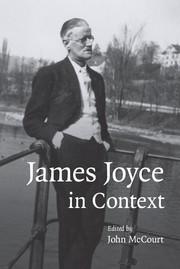Book contents
- Frontmatter
- Contents
- Notes on contributors
- Preface
- List of abbreviations
- PART I LIFE AND WORKS
- PART II THEORY AND CRITICAL RECEPTION
- PART III HISTORICAL AND CULTURAL CONTEXTS
- 14 Being in Joyce's world
- 15 Dublin
- 16 Nineteenth-century lyric nationalism
- 17 The Irish Revival
- 18 The English literary tradition
- 19 Paris
- 20 Trieste
- 21 Greek and Roman themes
- 22 Medicine
- 23 Modernisms
- 24 Music
- 25 Irish and European politics: nationalism, socialism, empire
- 26 Newspapers and popular culture
- 27 Language and languages
- 28 Philosophy
- 29 Religion
- 30 Science
- 31 Cinema
- 32 Sex
- Further reading
- Index
21 - Greek and Roman themes
Published online by Cambridge University Press: 14 July 2009
- Frontmatter
- Contents
- Notes on contributors
- Preface
- List of abbreviations
- PART I LIFE AND WORKS
- PART II THEORY AND CRITICAL RECEPTION
- PART III HISTORICAL AND CULTURAL CONTEXTS
- 14 Being in Joyce's world
- 15 Dublin
- 16 Nineteenth-century lyric nationalism
- 17 The Irish Revival
- 18 The English literary tradition
- 19 Paris
- 20 Trieste
- 21 Greek and Roman themes
- 22 Medicine
- 23 Modernisms
- 24 Music
- 25 Irish and European politics: nationalism, socialism, empire
- 26 Newspapers and popular culture
- 27 Language and languages
- 28 Philosophy
- 29 Religion
- 30 Science
- 31 Cinema
- 32 Sex
- Further reading
- Index
Summary
Reception Studies analyses the many ways in which later eras appropriate the Greco-Roman world, and has now become a very important part of the discipline of Classics. The twentieth century, in which Joyce published his work, proved to be one of the eras most devoted to the use of Greek and Roman material. Many exponents of modernism – Pound, Eliot, Yeats, Joyce – exemplify this trend.
This process of using Greek and Roman material is best described as ‘appropriation’ – defined by the Oxford English Dictionary as ‘to make over to anyone as their own’ – and is therefore to be seen as active rather than passive; as Eliot said, ‘mature poets steal’. The Irish dramatist Marina Carr concurs: ‘It seems that you are allowed to steal while learning the craft and that there is no crime in that.’ This active process is not necessarily conservative, since Greek and Roman authors may themselves be radical: Euripides renders problematical war (The Trojan Women), religion (Bacchae), sexual love (Hippolytus), feminism (Medea). Less radical texts such as Homer's Odyssey can be used in modern radical structures, as in Pound's epic poem The Cantos, and in Joyce's epic novel Ulysses.
During Joyce's lifetime (1882–1941), knowledge of the Greek and Roman world continued to constitute what Bourdieu calls ‘cultural capital’, showing a person (usually a man) to be educated, to be part of civilised society. Joyce's life and work demonstrate the truth of this observation.
- Type
- Chapter
- Information
- James Joyce in Context , pp. 239 - 249Publisher: Cambridge University PressPrint publication year: 2009
- 2
- Cited by



